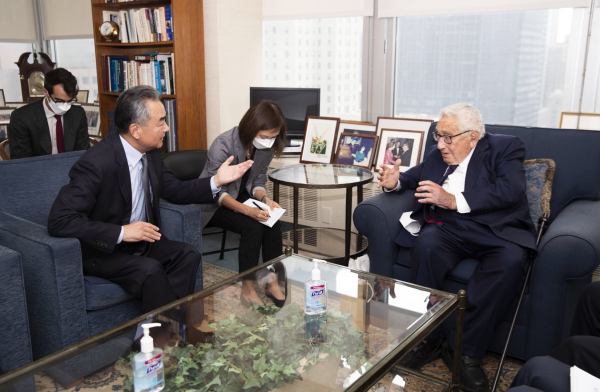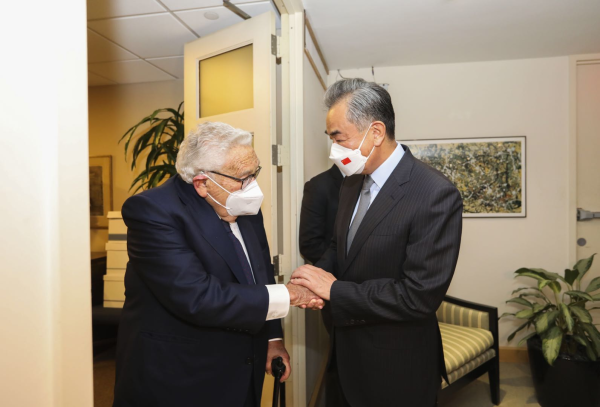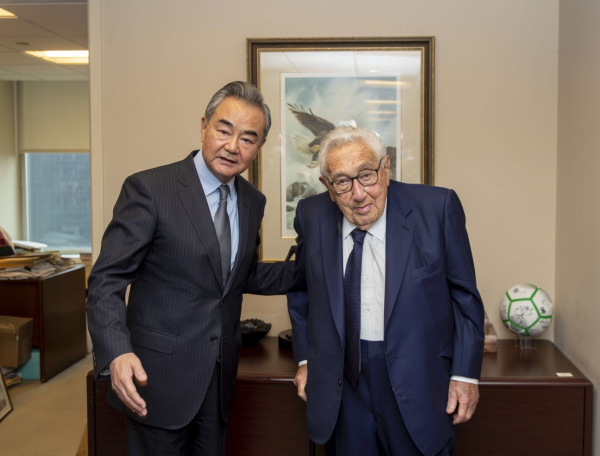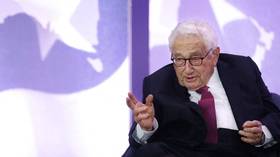Intro: "The three principles put forward by President Xi Jinping in developing China-U.S. relations, i.e. mutual respect, peaceful coexistence and win-win cooperation, are a takeaway from the development of China-U.S. relations over the past 50 years, and also basic principles that should be jointly followed in the next stage. President Joe Biden has made the "five noes" commitment (i.e. not seek a "new Cold War"; not seek to change China's system; the revitalization of its alliances is not against China; not support "Taiwan independence"; not look for conflict with China), but what the U.S. has done has run in the opposite direction."
HISTORICAL CHINA-TAIWAN BACKGROUND
✓
Wang Yi Meets with Former Secretary of State Henry Kissinger of the United States

On
September 19, 2022 local time, State Councilor and Foreign Minister
Wang Yi met with former Secretary of State Henry Kissinger of the United
States in New York.
Wang Yi congratulated Dr. Kissinger on his upcoming 100th birthday. He said, Dr. Kissinger is an old friend and good friend of the Chinese people, who has made historic contributions to the establishment and development of China-U.S. relations. The Chinese side appreciates that Dr. Kissinger has always been friendly to China and with confidence in China-U.S. relations. Hope Dr. Kissinger will continue his unique and important role in helping bilateral relations for an early return on the right track.
Wang Yi expressed, this year marks the 50th anniversary of President Richard Nixon's visit to China and the issuance of the Shanghai Communiqué. China and the U.S. should take a serious review of the valuable experience in the 50 years of exchanges. China's policy toward the U.S. remains consistent and stable. The three principles put forward by President Xi Jinping in developing China-U.S. relations, i.e. mutual respect, peaceful coexistence and win-win cooperation, are a takeaway from the development of China-U.S. relations over the past 50 years, and also basic principles that should be jointly followed in the next stage. President Joe Biden has made the "five noes" commitment (i.e. not seek a "new Cold War"; not seek to change China's system; the revitalization of its alliances is not against China; not support "Taiwan independence"; not look for conflict with China), but what the U.S. has done has run in the opposite direction. The U.S., out of a wrong perception of China, insists on viewing China as its most prominent rival and a long-term challenger. Some people even described successful stories of China-U.S. exchanges as failed ones. By doing so, they respect neither history nor themselves. Dr. Kissinger once warned that China-U.S. relations have been in the "foothills of a Cold War". An outbreak of a new Cold War will be a disaster for China and the U.S., as well as other parts of the world. The U.S. should adopt a rational and pragmatic policy towards China, return to the right track of the three China-U.S. joint communiqués, and safeguard the political foundation of China-U.S. relations.

Wang Yi stressed, the pressing task now is to properly manage the Taiwan question. Otherwise it could be subversive to China-U.S. relations. House Speaker Nancy Pelosi's sneaky visit to the Taiwan region, the U.S. Senate's review of The Taiwan Policy Act of 2022, and remarks related to "defending Taiwan", all of these have seriously challenged the three China-U.S. joint communiqués, and gravely undermined the political foundation of China-U.S. relations. Achieving peaceful reunification is our best wish, and we will make utmost efforts to this end. But it's noteworthy that the more rampant "Taiwan independence" activities are, the less likely it is to resolve the Taiwan question peacefully. A Chinese saying goes to the effect that "To defend even an inch of land, a country will not hesitate to sacrifice one thousand soldiers." The saying reflects the will and resolve of the Chinese people. If the Anti-Secession Law is violated, China will surely, in accordance with the law, take firm actions to safeguard national sovereignty and territorial integrity. Wang Yi stressed, to maintain peace and stability across the Taiwan Strait, the U.S. should earnestly return to the original meaning of the one-China principle, and unequivocally oppose and curb "Taiwan independence" activities.
Dr. Kissinger recalled the historical context of the Shanghai Communiqué reached with Chinese leaders. He expressed that the extreme importance of the Taiwan question to China should be fully recognized, and the U.S. and China need dialogue rather than confrontation and should build a bilateral relationship of peaceful coexistence.

✓
Washington is “wrong” in its perception of China and should not view it as a rival, Foreign Minister Wang Yi has said
A Cold War between China and the US would be a “disaster” for both countries and for the whole world, Foreign Minister Wang Yi warned on Monday, after meeting with former US Secretary of State Henry Kissinger.
During their meeting in New York, Wang Yi described Kissinger, who played a vital role in normalizing relations between Washington and Beijing in the 1970s, as a “good friend of the Chinese people.”
However, Beijing’s most senior diplomat cautioned that “an outbreak of a new Cold War will be a disaster for China and the US, as well as other parts of the world,” urging Washington to adopt a rational and pragmatic policy towards China.
According to the minister, Washington could do that by honoring its previous recognition of China’s position that Taiwan is part of its territory under the ‘One China’ policy.
Wang Yi said the recent visit by US House Speaker Nancy Pelosi to the island was detrimental for Sino-US relations, as was the US Congress’ Taiwan Policy Act 2022. The latter document, which was backed by the US Senate Foreign Relations Committee, aims to provide Taipei with billions of dollars in security assistance.
Wang went on to say that the US has “a wrong perception of China”, viewing it as “its most prominent rival and a long-term challenger”.
“Some people even described successful stories of China-US exchanges as failed ones. By doing so, they respect neither history nor themselves,” the statement read.
Peaceful reunification with Taiwan is China’s “best wish,” Wang said, adding that Beijing would do its best to achieve this end. He said, however, that the more “rampant” Taiwan’s independence-affirming activities become, “the less likely” the issue can be resolved peacefully.
His comments come after US President Joe Biden said on Sunday that American troops would defend Taiwan if it were attacked by China. This statement drew ire from Beijing, which said that it “deplores and firmly opposes” such a stance.
Taiwan has governed itself since nationalist forces led by Chiang Kai-shek fled to the island in 1949, after they lost the civil war to the Communists. The US government has, since the 1970s, officially recognized but not endorsed China’s sovereignty over Taiwan.
_____
RELATED
Beijing has reiterated its call for resolution of the Ukraine crisis through diplomacy
Beijing has responded to the announcement of partial military mobilization in Russia by calling for a peaceful settlement of the armed conflict in Ukraine.
China’s position that the parties involved in the security crisis should exercise restraint and seek a mutually acceptable solution has been consistent and clear, Wang Wenbin, a spokesman for the Chinese Foreign Ministry, told journalists during a daily briefing on Wednesday, as quoted by news agencies.
Russian President Vladimir Putin ordered the mobilization of some military reserve members on Wednesday. In a video address to the nation, he said the measure was necessary due to the situation in Ukraine, where Russian troops are facing “the entire Western military machine.”
Defense Minister Sergey Shoigu said his department was seeking to enroll into active service some 300,000 reservists, prioritizing those with combat experience and certain professions required to sustain the Ukraine campaign.
The troops will receive additional training before being fielded, the minister said. He promised that the reservists would be sent to man defensive positions along the 1,000km-long front line.
.jpg)




No comments:
Post a Comment